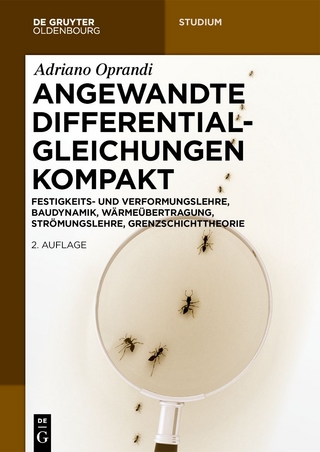
Quantum Hamilton-Jacobi Formalism
Springer International Publishing (Verlag)
9783031106231 (ISBN)
Ashok K. Kapoor served as a faculty member the School of Physics at the University ofHyderabad from 1979 to 2012. In addition to the teaching and research, he served as the Headof Special Centre of Integrated Studies, University of Hyderabad. He has taught undergraduateand postgraduate courses in many other universities and excellent institutions. The institutionswhere he served as a guest or a visiting faculty are the International Institute of InformationTechnology (Hyderabad), the Shiv Nadar University, Noida, the Tata Institute of FundamentalResearch (Hyderabad Campus), the Birala Institute of Technology and Science (HyderabadCampus), the Indian Institute of Technology, Bhubaneswar and the Chennai Institute ofMathematical Science. He obtained his Masters' degree in Physics from Allahabad Universityand the Ph. D. from Indian Institute of Technology in Kanpur. His main research interests arefocused on quantum field theory, Hamilton-Jacobi formalism of quantum mechanics, and incertain aspects of elementary particle physics phenomenology. He has written a textbookon Complex Variables published by World Scientific and has collaborated in writing twomonographs on Stochastic Quantization.Prasanta K. Panigrahi is a professor at the Indian Institute of Science Education and ResearchKolkata (IISER Kolkata), where he teaches and conducts research in theoretical physics in the fields of Bose-Einstein condensate, quantum information and computing, quantum optics,wavelet transform, and nonlinear dynamics. He obtained his Bachelor and Master of Science atRavenshaw College, Utkal University, Bhubaneswar, and Ph. D. at the University of Rochester,New York, USA. He was a post-doctoral fellow at the University of Illinois at Chicago, USA, andUniversity of Montreal, Canada, and subsequently he joined the faculty at the University ofHyderabad. He served as the Division Head of Quantum Information and Quantum Optics atthe Physical Research Laboratory, Ahmedabad, and as the Head of Department of PhysicalSciences, and Dean of Faculty Affairs at IISER Kolkata. He was also the officiating Director of theInstitute and Dean of International Relations and Outreach. He was ranked among the top tenIndian Science Personalities in 2017, primarily for his work on the development of an artificialintelligence-based algorithm which helps in diagnosing early-stage cervical cancer. He hasbroad interests in different branches of science and enjoys collaborating with experimentalists.S. Sree Ranjani is currently working as a content acquisition lead for the STM journals in theElsevier Publishing company. She has obtained her Ph. D. from the University of Hyderabad(UOH) in 2005 in Physics. She has post-doctoral research experience from the Indian Institute ofTechnology, Madras (IIT Madras). She was awarded a research associateship by the Council ofScientific & Industrial Research (CSIR), India followed by a three-year research fellowship underthe Fast-track scheme for young scientists, by the Department of Science and Technology (DST),Govt of India. Before switching to publishing, she taught physics to under-graduate,engineering and science, students at ICFAI foundation for Higher Education, Hyderabad foralmost a decade. During this period, she obtained a three-year grant for her research projectfrom the Science and Research Board (SERB), Govt of India, under the extramural researchgrant. In addition to teaching she handled administrative responsibilities, which included theHead of the Department, Physical Sciences and Associate Dean, Research. Her areas of interestinclude study of various potential models in quantum mechanics, supersymmetric quantummechanics, quantum optics, nonlinear dynamics and integrable models. She is interested inscience popularizing programs and conducts science workshops for middle and high schoolstudents, when time permits.
The Quantum Hamilton Jacobi Formalism. - Exactly Solvable Models.- New Results on Singularities of QMF.- Rational Shape Invariant Extensions and Exceptional Polynomials.- QHJ in the Context of Other Related Work.
"This is a short work ... consisting of 7 chapters, each of which ends with an extensive list of references. ... it is interesting and very well written. ... The chapters are basically independent of each other with the second being important for all. ... On the whole, for a brief book it does a good job of working through the subject matter it covers." (Paul F. Bracken, Mathematical Reviews, September, 2023)
“This is a short work … consisting of 7 chapters, each of which ends with an extensive list of references. … it is interesting and very well written. … The chapters are basically independent of each other with the second being important for all. … On the whole, for a brief book it does a good job of working through the subject matter it covers.” (Paul F. Bracken, Mathematical Reviews, September, 2023)
| Erscheinungsdatum | 07.10.2022 |
|---|---|
| Reihe/Serie | SpringerBriefs in Physics |
| Zusatzinfo | XV, 112 p. 13 illus., 3 illus. in color. |
| Verlagsort | Cham |
| Sprache | englisch |
| Maße | 155 x 235 mm |
| Gewicht | 207 g |
| Themenwelt | Mathematik / Informatik ► Mathematik ► Analysis |
| Naturwissenschaften ► Physik / Astronomie ► Allgemeines / Lexika | |
| Naturwissenschaften ► Physik / Astronomie ► Quantenphysik | |
| Naturwissenschaften ► Physik / Astronomie ► Theoretische Physik | |
| Schlagworte | classification of exactly and quasi exactly solvable models • complex Scarf-II potential and optical systems • exact quantization condition • exceptional orthogonal polynomials • PT symmetry • Quantum Hamilton-Jacobi Formalism • rational extension of potential models |
| ISBN-13 | 9783031106231 / 9783031106231 |
| Zustand | Neuware |
| Informationen gemäß Produktsicherheitsverordnung (GPSR) | |
| Haben Sie eine Frage zum Produkt? |
aus dem Bereich


